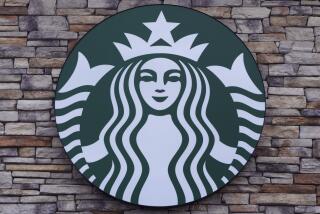Pillsburyâs Restaurant Group Gets New Chief
The Pillsbury Co., which has had increasing problems with the performance of its restaurant operations in recent years, has announced the resignation of J. Jeffrey Campbell as chairman and chief executive of the restaurant group.
The diversified food concern, based in Minneapolis, which gave no reason for the resignation, later announced a series of management changes. A Pillsbury spokesman said the changes amount to a redistribution of Campbellâs responsibilities and the abolition of his job as chairman of the restaurant group.
Charles S. Olcott, 41, was named president and chief operating officer of Pillsburyâs ailing Burger King subsidiary to oversee U.S and international operations. Olcott had been president of the domestic Burger King segment.
Asked whether Pillsbury would fill Campbellâs position, the spokesman, Larry Haeg, replied: âNot as we are presently structured.â
Pillsbury stock closed up $1 at $36.75 Monday on the New York Stock Exchange.
Several food industry analysts saw Campbellâs resignation as the result of the companyâs dissatisfaction with Pillsburyâs restaurant operations.
âRestaurant operating profits should be down 8% this year, and were down 13% last year. If he were a baseball manager, heâd have been fired years ago,â said analyst John McMillin of Prudential-Bache Research.
Campbellâs departure is the second major shake-up in Pillsbury management this year. On Feb. 29, the companyâs former head, William H. Spoor, returned as chairman and chief executive, replacing his one-time protege, John Stafford. The change followed mounting concern over lackluster performance in the restaurant division.
Burger King, which contributes about 40% of Pillsburyâs operating income, has lost market share to McDonaldâs Corp. Its share fell this year to 17% of fast-food outlets from a 17.4% high in 1986.
On March 17, the company announced plans to sell its 580-unit Godfatherâs pizza chain. It also said it would sell or close less-profitable branches of its Steak & Ale and Benniganâs chains and reorganize its Burger King operations.
Despite these actions, Prudential-Bacheâs McMillin said results remain poor, making it no surprise that Campbell left.
âThe company was dissatisfied with him,â agreed food industry analyst Nomi Ghez of Goldman, Sachs & Co.
Ghez expects Pillsbury to announce at analystsâ meetings in Minneapolis on Tuesday and New York on Thursday increased spending in fiscal 1989 in the restaurant division. The spending likely will be for capital investment, remodeling and marketing efforts, she said.
Pillsbury also announced the following management changes Monday:
- Richard T. Crowder, 48, senior vice president and corporate risk officer, assumed the added responsibility of Distron, Burger Kingâs distribution and procurement division.
- Jerry W. Levin, 44, executive vice president for corporate development, assumed added responsibility for S&A; Restaurant Corp., which includes Steak & Ale and Benniganâs.
- John L. Morrison, 43, executive vice president and chairman of Pillsbury U.S. Foods, was given added responsibility for the Haagen-Dazs Co.
More to Read
Inside the business of entertainment
The Wide Shot brings you news, analysis and insights on everything from streaming wars to production â and what it all means for the future.
You may occasionally receive promotional content from the Los Angeles Times.










